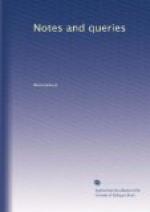Jones of Brecon, who tells us that the cry of the Cron Annwn is as familiar to the inhabitants of Ystrad Fellte and Pont Neath-vaughan [in Glamorganshire] as the watchman’s rattle in the purlieus of Covent Garden—for he lived in the days when watchmen and their rattles were yet among the things of this world—considers that to these dogs, and not to a Greek myth, may be referred the hounds, Fury, Silver, Tyrant, &c., with which Prospero hunts his enemies “soundly,” in the Tempest. And they must recall to the minds of our readers the wisk, wisked, or Yesk hounds of Devon, which are described in the Athenaeum for March 27. 1847, as well as the Maisne Hellequin of Normandy and Bretagne.
There has been much discussion respecting the signification of the word Annwn, which has been increased by the very frequent mistake of writing it Anwn, which means, unknown, strange, and is applied to the people who dwell in the antipodes of the speaker; while Annwn is an adaptation of annwfn, a bottomless or immeasurable pit, voidless {295} space, and also Hell. Thus we find, that when Pwyl, or Reason, drives these dogs off their track, the owner comes up, and, reproving him, declares that he is a crowned king, lord of Annwn and Pendaran, i.e. chief of thunder. (See Myth. Ant. Druids, p. 418.)
This Prince of Darkness is supposed to be the spouse of Andraste, now corrupted into Andras, and equivalent with Malt y nos, the Diana or Hecate of the ancient Britons.
These dogs sometimes appear singly, on which occasions they sit by the side of a stream, howling in so unearthly a manner, that the hapless man who finds one in his path usually loses his senses. This seems to have a connection with the “Manthe Doog” of the Isle of Man; but the tradition is not, we suspect, genuine.
Seleucus.
No. 2. Cyoeraeth or Gwrach-y-rhybin.—Another instance of the grand, though gloomy superstitions of the Cymry, is that of the Cyoeraeth, or hag of the mist, an awful being who is supposed to reside in the mountain fog, through which her supernatural shriek is frequently heard. She is believed to be the very personification of ugliness, with torn and dishevelled hair, long black teeth, lank and withered arms and claws, and a most cadaverous appearance; to this some add, wings of a leathery and bat-like substance.
The name Cy-oer-aeth, the last two syllables of which signify cold-grief, is most descriptive of the sad wail which she utters, and which will, it is said, literally freeze the veins of those who hear it; she is rarely seen, but is heard at a cross-road, or beside a stream—in the latter case she splashes the water with her hands—uttering her lamentation, as if in allusion to the relatives of those about to die. Thus, if a man hears her




